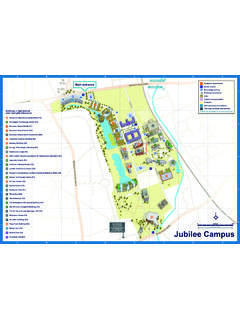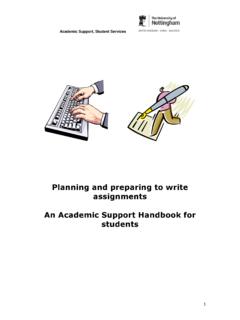Transcription of The Participant -Researcher Relationship in …
1 Mitchell, Nick (2010) The researcher Participant Relationship in educational research . MPhil thesis, University of nottingham . Access from the University of nottingham repository: and reuse: The nottingham ePrints service makes this work by researchers of the University of nottingham available open access under the following article is made available under the University of nottingham End User licence and may be reused according to the conditions of the licence. For more details see: more information, please contact OF nottingham , SCHOOL OF EDUCATIONThe Participant - researcher Relationshipin educational ResearchMPhil.
2 ThesisNick MitchellMay 2010iiContents AcknowledgementsiiiAbstract iv1. Introduction and justification for the Justification for Inquiry strands addressed in this An overview of sections 2-562. Literature Literature search Ethical guidance and Informed Protecting participants from possible researcher perspectives on Aconstructivist Summary523. Methodology Ontological and epistemological Recruitment of The recruited sample of research Data Data analysis How the methodology of this study addresses the inquiry strands794.
3 Participation Analysis by Participant Thematic Case Links between the case studies and thematic Findings with respect to the inquiry strands1485. Inquiry Strand I - Participants experiences and/or perceptions of educational research encounters andof educational Inquiry strand II - participants' perceptions of educational research Inquiry strand III - The relevance of ethical guidance for participants in educational The challenges ofresearching Evaluation of the contribution to knowledge made by this Evaluation of personal Implications179 References 186 Appendices193 Appendix 1 Indicative list of searchstrings used in literature 2 Text used in TES and DCFS 3
4 Speculative e-mail 4 Speculative mailing 5 Flier/poster included with speculative e-mail and 6 TES advert text June Article in the Times educational Supplement 8 Characteristics of the achieved sample of 9 Ethics statement for the School of Education, University of 10 Participant information 11 Participant consent 12 Interview script. iiiAcknowledgements I should like to thank all those who agreed to take part in this study and, perhaps especially, my (extraordinarily patient) supervisors Dr. Andrew J Hobsonand Dr.
5 Peter Gates of the School of Education, University of nottingham . I should also like to thank Linda Ellison and Hugh Busher for their helpful and constructive comments on this thesis during and after a viva voce dissertation presents the outcomes of an empirical study of participation in educational research . Through individual interviews,the research explored the experiences and perceptions of a group of fifteen current or former teachers who had taken part in the educational research of others. This study suggests that the majority of this group of participants had been involved in research which did not conform to the expectations laid down in the ethical guidelines of the British educational research Association.
6 Participants reported experiences, however, were not generally associated with concerns over research ethics but were often strongly influenced by the attitude of the individual researchers with whom they had contact. It also emerged that participants past histories of research involvement played a significant part in shaping their expectations and experiences of research involvement. This suggests that knowledge of the participation histories of those who take part in educational research might be a productive means for informing the development of research methodologies and could also suggest methods to target future recruitment of participants more effectively11.
7 Introduction and justification for the IntroductionThis is an empirical study of participation in educational research . It seeks to explore something of how it feels and what it means to take part in the research of others through thefirst hand accounts of those who had experience of being research participants in this way prior to taking part in this study. The field of inquiry coveredby this work could be considered as research ethics, but with ethics here conceived of in a broader sense than is generally implied when,for example,it is used in connection with regulatory ethical frameworks.
8 I feel it is important to make the point right at the start that the aim of this study was not to bring to light what might be seen as examples of ethical shortcomings on the part of researchers but rather to inform a refinement of the way researchers approach participants both in the sense of ethical regulation and also in broader methodological terms. Indeed, I argue that an attitude on the part of the research community, in which relations with participants are seen primarily in ethical terms,contributes to the difficulty faced by those seeking to recruit participants to studies such as this.
9 research on participation should be a legitimate area of research per sebut, as I will attempt to show, an understanding of the complexities of this Relationship would be more secure were it based on empirical research and not on researchers own, at best indirectly informed and frequently theory ladenspeculationsabout the Relationship . Empirical research , I suggest, offers the prospect of informingresearch methodologies that are more responsive to what participants bring with them to the research is generally accepted that an ethical Relationship between researchers and their participants should be one in which researchers seek to avoid harm occurringto participants as a result of their involvement in research and, moreover.
10 This Relationship should be one in which the researcher demonstrates respect for participants througha concern for their dignityand privacy(British 2 EducationalResearch Association2004; Social research Association2003). Whilst this investigation does indeed explorethe perceptions of research participants in relation to concerns of this nature, it also considerswider aspects of the Relationship between researcher and participantwhich, I argue, are perhaps of more significance to participants in respect of how and whether they volunteer to take partin educational research in the study presents an accountof the experiences of fifteen qualified teachers who had previously participated, in differing ways.







